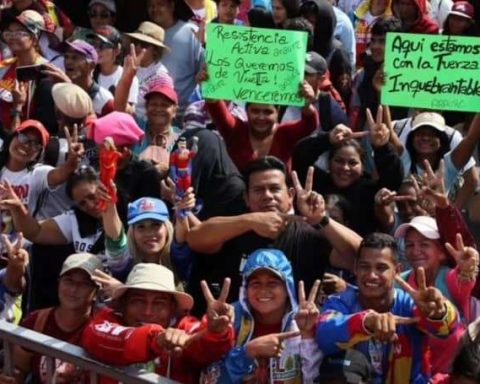This Tuesday, September 6, at noon and in the Patio de los Cañones, President Gabriel Boric will announce the details of his first cabinet change, which adds to the resignation of Jeanette Vega (PPD) from the Ministry of Social Development, after the leak of a call between his adviser and Héctor Llaitul, leader of the CAM. The information was confirmed by who appears today as an immovable in the president’s cabinet, the head of the Treasury, Mario Marcel. In fact, “the economic team is not touched”, they are quick to point out close to the Palace. Those who would have their days numbered, at least in the position they hold until now, are the Minister of the Interior and Public Security, Izkia Siches, and the Minister of the General Secretariat of the Presidency (Segpres), Giorgio Jackson.
With this change in his team, the Head of State intends to give a signal that calls for dialogue with the political forces behind the Rejection, a sector that after this Sunday’s plebiscite feels empowered and has negotiating power. A cabinet change of this magnitude could mean a strategic deployment that responds to the condition of the right, which has stated that the dialogue with the Government on the continuity of the constituent process depends, to a large extent, on a clear design of what will be the interlocutors with whom they will hold talks.
This decision was advanced by Boric on different occasions. In the speech he gave on Sunday night, recognizing the triumph of the Rejection, he assured that “Facing these important and urgent challenges will require prompt adjustments in our government teams to face this new period with renewed vigor.”
In this regard, after the results of the referendum, the senator and president of the National Renewal (RN), Francisco Chahuán, was clear in stating that “we want to know who will be the interlocutors with whom we will have to talk in the coming days.” The same was expressed by the helmsman of the UDI, also Senator Javier Macaya, who added that “we have transmitted to the Government that it is important that they order their interlocutors a little in this matter (continuity of the constitutional process). We are waiting for them to do so “.
A call that is consistent with a logic of permanent criticism from this sector towards the work of Izkia Siches and Giorgio Jackson as Secretaries of State. In this way, the scenario seems to be the ideal for Chile Vamos, a coalition that, as of last Sunday, once again acquires a leading role, considering that the discussion is going to turn to Congress, a space where it has an important representation. Now, it seems, the conditions for the dialogue are installed by actors who, until this Sunday’s plebiscite, developed the strategy of staying out of the front line of the campaign and, above all, of the critical political discussion regarding the steps to follow after of the triumph of Rejection.
Faced with this scenario, and before his imminent departure, the disputed management of Siches in the Ministry of the Interior added a new ingredient this Monday, after the Comptroller’s Office described his action as sloppy, when he stated that a plane with deported Venezuelans returned to Chile with all its occupants, during the second term of former President Sebastián Piñera. In this sense, Comptroller Jorge Bermúdez pointed out that “it is necessary to note that although the circumstances analyzed do not constitute an infringement of the aforementioned principle, they reveal a lack of thoroughness in the preparation of the exposed information (…), the that is not consistent with the relevance of the position held by the requested authority”.
For his part, Jackson’s departure could be due, to a large extent, to his problems in fulfilling the coordination role with Congress, which demands being at the head of the Segpres, and some specific political errors, reflected in the poor relationship he had with some pro-government parliamentarians, such as Senator Fidel Espinoza (PS), who publicly questioned his management. He was also questioned for his statements, such as when he assured that the continuity of the government program was conditioned by the victory of the Approval, and his openly critical statements of the former Concertación, where he judged the actions of previous political generations and their ethical behavior.
Although the current head of Segpres had to retract, his trial triggered a series of reactions and deepened a crack in relations between two coalitions that, during these first months of management, have had serious problems maintaining coexistence. The defeat of the Approve revives the ideological and discursive confrontation between Democratic Socialism and Approve Dignity, which recently had a new chapter, when the president of the Communist Party (PC), Guillermo Teillier, called to defend the triumph of the new Constitution in the street, which was quickly reversed by his peers helmsmen of official collectivities.
A problem referred to on Monday by the deputy and president of the Lower House, Raúl Soto (PPD), who after meeting with the President in La Moneda, told CNN that “the political axis of Chilean society tends rather towards the center-left, it tends to moderate a bit, and I think that this is a signal that all political actors have to consider in order to act accordingly and move towards where Chilean society moves “.
In this rearrangement of pieces – they comment close to the ruling party – Siches and Jackson will not have the same treatment. While for the still Minister of the Interior the destination, they assure, would be to leave the Government, in the case of the head of the Segpres, he would be relocated. This situation is accompanied by data from reality: the minister is independent, so the cost – beyond the personnel – would not be paid by any party, an issue that, on the contrary, would allow someone from Democratic Socialism to be strategically placed in that position. , as a sign of governability. In the case of Jackson, however, her destination would probably be the Ministry of Social Development, a portfolio that was already classified as strategic in the Government of Sebastián Piñera, when Alfredo Moreno took charge of it. This landing would allow Jackson to maintain personal contact with the President, maintaining his role as one of his top advisers.
Outside of these adjustments, the presidential surgery could also reach Health, Energy, and some other ministry with an independent as head.
Change of internal teams
Apart from the change of cabinet as such, the arrival of advisers to strategic projects has been observed. Such is the case of Francis Arellano (Common), which would come to give new energy to the Government’s Good Living program, a key and fundamental issue for the strategy in the Mapuche conflict zone.
The lawyer and researcher of the Fundación Nodo XXI had received the invitation a few days ago, from the head of the initiative, Víctor Ramos, to be in charge of the program’s political coordination team. He gave the notice only this Monday that he would join, because he was previously involved in the campaign for approval.
Arellano is a lawyer from the University of Chile. According to Nodo XXI, his areas of specialization are human rights, labor law, and political theory. He is a professor of Political Theory at the Alberto Hurtado University, he was general coordinator of the Fech in 2012 and chief of staff of deputy Gabriel Boric between 2014 and 2016. In addition, he was an advisor to the conventional Ivanna Olivares.
Added to this is the key role it had in the previous conversations –was the one who arrived with a draft on which they worked for the document of the Broad Front “Aprobar para Concretar”– about the agreements to which the ruling party finally arrived around reforms to the new Constitution and that sought to clarify certain points of the proposal, along with committing to change it.
According to sources inside La Moneda, the strengthening of this team responds to the delicate political situations that have been experienced in recent weeks and they add that the ministerial change would not affect the project, since this would be a “team constituted by the President , who has a special mandate over him”, for being “part of the government’s design”.
political committee meeting
“The government’s commitment to govern and push its program is intact,” Minister Camila Vallejo said on Monday. The determination was in line with the statements of different presidents of the ruling party’s base coalitions, when they left the weekly political committee at the Palacio de La Moneda at around 1:30 p.m., an instance that began around 11:30 a.m.
“The conviction of President Boric, who told us that there is no renunciation of the government program here. Here it is important to distinguish that, on the one hand, the people of Chile rejected a constitutional text that was plebiscited on Sunday, September 4, and another thing is the Government with its program that took it to La Moneda, and that program continues “, assured Juan Ignacio Latorre, president of the Democratic Revolution, upon leaving the meeting at the Palace.
Latorre’s focus was almost like a discursive line followed by other party helmsmen, such as Patricio Morales (PL), who stated that “we will not hesitate for a minute to continue governing”, and Guillermo Teillier (PC), who committed the President “all the support and willingness of the Communist Party to support him and continue with the program and with the Government.”
According to those attending the weekly meeting, the President outlined the fundamental issues: advancing the Constitution and the government program.
One of the presidents of the ruling parties – they assured when they left – commented that the center-right was “bolstering” with the results of Sunday, where the Rejection beat the Approval with a 61% against 38%.
“The project promoted and supported by President Boric was defeated by the citizens,” said Chahuán (RN) on Sunday, while Macaya (UDI) added that this is “the defeat of the refoundation of Chile and that cannot be dissociated to the government of this defeat, of the option that it strongly supported”.
Faced with this, they say that some mentioned the importance of strengthening support for the government program.
Yesterday afternoon, at 4:00 p.m., the party presidents of the ruling party’s base coalitions met again. This time to take stock of the votes and arrive prepared for the talks with the center-left and right that will take place this Tuesday afternoon in La Moneda. This, because the President summoned all the presidents of parties with representation in Congress to, according to the letter, analyze the “continuity of the constituent process.”


















